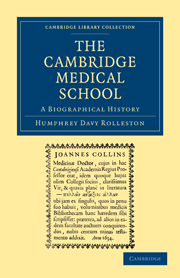Book contents
- Frontmatter
- Contents
- List of Plates
- Preface
- I The Medical School
- II Department of Anatomy
- III Department of Physiology
- IV Department of Biochemistry
- V Department of Experimental Psychology
- VI Department of Pathology
- VII Department of the Quick Chair of Biology
- VIII The Regius Chair of Physic
- IX John Caius
- X The Downing Chair of Medicine
- XI The Linacre Lectureship in Physic
- XII The Chair of Surgery
- Index of Persons
- Index of Subjects
- Plate section
XI - The Linacre Lectureship in Physic
Published online by Cambridge University Press: 07 September 2010
- Frontmatter
- Contents
- List of Plates
- Preface
- I The Medical School
- II Department of Anatomy
- III Department of Physiology
- IV Department of Biochemistry
- V Department of Experimental Psychology
- VI Department of Pathology
- VII Department of the Quick Chair of Biology
- VIII The Regius Chair of Physic
- IX John Caius
- X The Downing Chair of Medicine
- XI The Linacre Lectureship in Physic
- XII The Chair of Surgery
- Index of Persons
- Index of Subjects
- Plate section
Summary
THIS lectureship at St John's College, founded in 1524 by Thomas Linacre (1460–1524), is the oldest medical endowment in the University, for it preceded the establishment of the Regius Professorship by sixteen years. It, however, never played the important part intended by the founder for reasons given elsewhere (vide p. 7) and is of historical interest only. The first lecturer appears to have been Christopher Jackson, who was buried in the old chapel on July 2, 1528, his death according to a brass erected to his memory in the new antechapel being “e sudore britañico” or due to the sweating sickness; the fourth of the five epidemics between 1486 and 1551 of the English sweating sickness, probably allied to influenza, occurred in 1528–9. On the other hand, T. Baker, the historian of St John's, and C. H. Hartshorne of St John's, rather ponderously described by Dibdin as “the young thorough-bred bibliomaniacal racer”, both state that George Daye (1501?–1556), Public Orator in 1528, Master of St John's in 1537, and Provost of King's from 1538 to 1548, “studied physic in his younger days and was the first that ever held the Linacer lecture, being complimented by Caius on his skill in that Faculty”. As Jackson held the lectureship for such a short time, Daye may have been the second Linacre lecturer, and if so, certainly the first occupant of it well known in the University, and that this is probable appears from the fact that Caius did not enter Gonville Hall until September 1529.
- Type
- Chapter
- Information
- The Cambridge Medical SchoolA Biographical History, pp. 213 - 220Publisher: Cambridge University PressPrint publication year: 2009First published in: 1932



